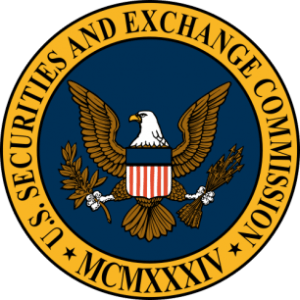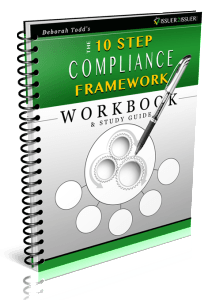Today, we have a fascinating article on pending Senate legislation which would DRAMATICALLY increase fines for SEC violations – OUCH!
PLUS – due to popular request, we will be showcasing our original “Solving the Compliance Puzzle” Resource series again – beginning today! See below…
So…here goes…today’s Monday Muni Minutes!
Enjoy and have a great week! Deb
CURRENT EVENTS
“Decimal Dust” – Legislation to Increase SEC Civil Penalties?
Heads up…you may want to watch this one…the Stronger Enforcement of Civil Penalties Act of 2015.
For ease, it’s dubbed the SEC Penalties Act of 2015…
In addition to the recent $9.3 million wave of enforcements against underwriters under the MCDC, this bill, if passed, would give the SEC some razor-sharp financial jaws for assessing civil penalties – hefty penalties.
Why is this happening?
Well, this bill was originally brought up in 2012, but is now coming back to address what Senate Banking Committee members and what Senator Chuck Grassley, R-Iowa are calling “decimal dust” penalties now in place.
So what is “decimal dust?”
Decimal dust is a term used when the rate of penalties is so small compared to the upside of financial gain, that there really is no deterrent for bad behavior. In other words, the penalties are seen more as “the cost of doing business,” rather than a true penalty.
So how will the legislation impact issuers?
Elaine Greenberg, a partner at Orrick shared how the bill could impact municipal entities…corporately and individually.
“Part of the remedies [the SEC] would seek as part of the enforcement action would be civil penalties,” she said. “So this legislation, if it went through, would impact the SEC’s ability to seek more severe and significant monetary penalties against municipal entities and persons associated with those entities.”
Here are a couple of key “penalty” comparisons:
- Individuals: $1 million fine – up from $160,000 currently
- Entities: $10 million fine – up from $775,000 currently
- Repeat offenders: Triple the fines if repeat offense within 5 year period
- Fines can be issued “in-house” as opposed to only in federal court
Senator Jack Reed, D-RI, the other bill co-sponsor along with Senator Grassley, said, “This bipartisan bill gives the SEC the firepower it needs to crack down on Wall Street fraud and punish repeat offenders.”
Grassley continued, “Investors deserve real protection, and the law needs to change to ensure the punishment fits the crime.”
[Editor’s Note: You can read more by either clicking on the SEC Enforcement Forum 2012 link (when the 2012 bill was introduced, which is virtually identical to the 2015 version), or by checking out the article on CFO.com here.]
OUT & ABOUT
Conferences:
There are about 30 conferences and regional events for the second half of 2015…
You can go to this Bond Buyer link to review what coming up and register!
Resources:
Sign up! Webinar: MCDC – What Comes Next for Muni Underwriters
Date: Tuesday, July 21, 2015
Time: 12:00 PM Eastern Daylight Time
By: DIVER by Lumesis and sponsored by the Bond Buyer
Check out the “muni deal of the week”…try if for FREE and look at it from the bondholder’s perspective.
On-Demand Post Issuance Compliance Training for Issuers
“Compliance Basics” – a FREE, 3-part video Compliance Framework training, plus the Monday Muni Minutes.
Just Released – with a valuable and amazingly cost-effective “team learning” option! NEW In-Depth Training, PIC Essentials: The Audit-Proven Blueprint – covering, The IDR – Form 4564, Project Accounting Boot Camp and our hot-button friend, PBU!
On-Demand Webinar
Resource: On Demand Replay of Continuing Disclosure after MCDC
Slides: Final Slide Deck for Continuing Disclosure after MCDC
Muni Market Minute Updates
(Quick news bits on topics we’ve covered in earlier MMM editions!)
Their Day in Court – Pension Legislation Fight Saga in Chicago
Although the Supreme Court ruled that pension reform as passed was unconstitutional in Illinois, the battle rages on…and on.
The City of Chicago and unions went head-to-head…and it WAS ugly.
The City, which has been in a precarious financial position for years, defended the legislation and their position by saying their plan would actually preserve pensions…rather than them hit
insolvency in a decade or so.
The City’s stance:
“SB1922 therefore provides a massive net benefit for participants, because it takes funds that would otherwise become insolvent and obligates the city to fund them on an actuarial basis, ensuring they will be able to meet their obligations, the City of Chicago Pension Brief Case No 14 CH 20027 read. “Thus, under the plain language of the pension clause SB 1922 does not ‘diminish or impair’ pension benefits; it preserves and protects them.”
The Union’s stance:
“The act diminishes pension benefits in at least three ways: it reduces members’ annual, automatic annuity increases; it eliminates those annuity increases altogether in certain years; and it increases the required pension contributions of current employees,” according to the Chicago Unions Pension Brief Case No 2014 CH 20027 filings.
The City contends that, under contract law, changes can be made as there were benefits received by the other party – which they said they negotiated with 28 of the 31 unions – and they are hoping the court agrees.
There are billions of dollars at stake here – per the city filing.
“There can be no doubt that any reductions in benefits in SB1922 were a bargained-for exchange adopted by the General Assembly for which the city provided valuable consideration – billions  of dollars in new funding that the city was not previously obligated to provide.”
of dollars in new funding that the city was not previously obligated to provide.”
The unions contend that the City, under the home rule powers can raise the money needed to pay pension obligations… “[It] is crystal clear that the city has the power to raise revenues to contribute more… than the statutorily mandated floor.”
So, what will it be…pension plan reductions or new taxes?
You can clearly see, passions are running high along with the financial stakes…for both sides.
As the slogging continues, the rating agencies, investors and the rest of the muni community at large will continue to pay VERY close attention.
[Editor’s Note: If you recall, the city faces a $550 million spike in pension funding next year – just for the police and fire pensions. Ratings continue to remain precarious and Chicago will have to make some tough decisions soon. What are your thoughts? Also, you can Google Scranton, PA pensions and see what is happening there…]
Back by Popular Demand….
Given the recent settlements by the SEC and focus on “what might be coming next” for issuers, let’s make sure we are all…
Solving the Compliance Puzzle!
I have to say that this is still one of my favorites – I fell in love with this graphic as it so clearly and brilliantly represents the puzzling complexity we are dealing with, as issuers, in meeting our compliance needs.
We also know that both the IRS and SEC are paying much closer attention to it these days – and that it is our obligation as issuers to understand (and have fully complied with) our respective bond covenants.
As part of this effort, each week for the next ten weeks, we will focus on providing tips, insights and resources for one new line of our compliance puzzle.
So, are you ready?
Today, we are going to touch briefly on the first line of our puzzle – Instructions.
Have you ever started on a project that you thought – oh, I can do this…while the instructions remain safely tucked away in the box? I know I sure have. Well, for post issuance compliance, it simply does not work well that way.
I know this may sound overly basic, but what is one of the best ways to make our compliance life easier?
Find, read and follow the bond compliance instructions.
Here are several key instructional resources you can use.
So, let’s start with voluntary compliance.
A key item regarding tax exempt compliance is Publication 5091 – Voluntary Compliance for Tax-Exempt and Tax-Credit Bonds.
Pub 5091 addresses several key areas of bond compliance: What you need to be aware of at the time of the bond issuance, issuer reporting requirements post issuance, remedial action (VCAP) as well as some foundational items we will discuss in much more detail in the near future – such as proper documentation, effective policies and procedures…plus how to be better prepared the event of a bond audit.
What if you are a 501(c)(3)?
If you are a 501(c)(3) issuer – a key compliance guide is Publication 4077 – Tax Exempt Bonds for 501(c)(3) Charitable Organizations.
Pub 4077 covers many areas, including what projects qualify for 501(c)(3) financing, private business use, research facilities, arbitrage rebate requirements, management and service contracts, treatment of hedge bonds and remedial action for non-qualified use.
Another valuable resource is Publication 5005 – Your Responsibilities as a Conduit Issuer of Tax-Exempt Bonds.
Having been through two conduit audits in the last six years, I know first-hand how important (and possibly misunderstood) this area of compliance can be.
So what are conduit financings?
If you are a state or local government and you issue what are commonly referred to as “conduit financings”, this will likely apply to your bonds. In tax-exempt conduit bond offerings, the governmental unit issues the bonds and makes “loans” to other entities – who then become the “conduit borrowers” (i.e. a State issues bonds to finance projects by qualifying departments who are qualifying subdivisions of that State). The conduit borrower typically oversees the use of the bond funds, is responsible for the debt service as well as properly reporting ongoing compliance to the conduit issuer.
In the event of an audit, the conduit issuer is ultimately responsible for the IRS compliance, but the conduit borrower generally holds key information which will be needed. As such, a carefully executed loan agreement and ongoing compliance process is crucial to assure success for conduit financing bond audits.
Need more information?
For more information and other “instructions” resources, check out our Knowledge Library.
Stay tuned for next week’s closely related piece of the puzzle – Regulations.
We really do look forward to your feedback – and to provide the best content possible.
Two Quick Questions: 1) In looking at the compliance puzzle graphic, which piece/line do you find the most frustrating and why? 2) I am getting a few requests for increased coverage on the Municipal Advisor Rules – as increased costs to MAs will likely be passed along to you as the issuer, is this of value to you? If so, I will likely bring in a guest writer…
Just drop us a line in the comments below and let us know, OK?
In closing, we are so excited that PIC Essentials: the Audit-Proven Blueprint is now available! A special welcome to members who joined us last week at the special “member’s only” discount rate. We look forward to your comments, questions and chatting with you in the Private Facebook Group – Club PIC!
NOTE: You can still join the learning group here: PIC Essentials: the Audit-Proven Blueprint.
Plus, as we believe so strongly in the team approach to success, we are offering a tremendous “team discount,” where you and four additional compliance members within your agency or company can join the series right along with you…for only $70 more!
We hope you found this week’s edition of the Monday Muni Minutes valuable and informative.
Chat soon!
As always, your comments are welcome…scroll down and let us know what you think about any of the articles!
To your compliance success,
Debbie
The greatest compliment you can pay us is to share this newsletter with your issuer friends….
P.S. Remember, invite your issuer friends to join us on Issuer 2 Issuer and to get their free online training, PIC Basics!
P.P. S. PIC Essentials: the Audit-Proven Blueprint is now available! You can sign up for the informative, on-demand webinar series by clicking here!
As we are strong believers in the team approach to compliance, you can include four additional members of your team (within the same agency please) to take the training for only $70 more – that is truly a great deal.
P.P.S Want a one-click way to get faster information? If you are on LinkedIn, you can get access to breaking muni news articles as well as interesting compliance tips and resources, posted by us during the week. Join our private LinkedIn Group Page, and follow us on our Company Page.



